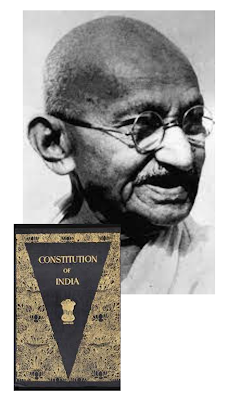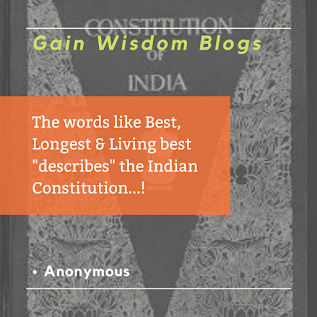What were Gandhiji's views towards our constitution?
What were Gandhiji's views towards Indian Constitution?
What is Gandhiji's Jantar or Talisman? What type of Constitution did he want to have to guide India? Were the ideals of Gandhiji overruled any time in the past?
These are a few questions that I will be trying to answer in this post...
First, let me tell you what is Gandhiji's talisman?
What is Gandhiji's Talisman?
A Talisman is generally referred to as any object which is believed to bring good luck.
And Gandhiji's Talisman is a famous piece of advice by Gandhiji to the people of India which can be used by anyone when he or she finds himself in difficulty or problem.
Now, let's dive into his thoughts & ideas about a better constitution...!
 |
| Gandhiji's Talisman is considered to be one of the most inspiring words that he has left for the people of India. Image Source |
What views did he share about Indian Constitution?
In 1947, after the Independence of India, while drafting the Indian Constitution the members of the constitution assembly met "The Father of our Nation" - Mohandas Karamchand Gandhi or Mahatma Gandhi to take in his views and opinions on amending a type of constitution for India that would not only guaranty equality but also executes it remarkably.
Gandhiji's main aim was to provide equality and justice to every man of India.
So, when asked about the same he gave the members a Talisman which says like this-
"I well give you a talisman. Whenever you are in doubt or when the self becomes too much with you, apply the following test :-
Recall the face of the poorest and the weakest man whom you may have seen and ask yourself if the step you contemplate is going to be any use of him. Will he gain anything of it? Will it restore him to a control over his own life and destiny? In other words, will it lead to Swaraj for the hungry and spiritually starving millions?
Then you will find your doubts and yourself melting away."
 |
| Gandhiji's Talisman in its hindi version is known as 'Gandhiji ka Jantar' is so much motivating that it is included in Ncert textbooks. Image Source |
For many years, these famous words of Gandhiji have inspired many leaders of India as well as people from all over the world.
It served as an important document to check the relevance of government policies or decisions. It also helps to check whether the people residing in the higher status are acting towards fulfilling the needs of the poor of the country or not.
Gandhiji's Jantar is also referred to as one of the most important & motivating guidance or instruction that he has left with us. It is so encouraging that it is printed on the 2nd or 3rd page of NCERT textbooks. In the Hindi books, it is referred to as 'Gandhiji ka Jantar'.
It persuades not only the people in power but also the common citizens to refine and rethink their every action that may impact the poverty-stricken or impoverished population of our country who may be deprived of some or the other facility.
It especially serves as a cornerstone of a democratic country like India as a whole that promises to give fundamental & basic rights to the majority of its population.
But, were these Gandhiji's ideals provided to every citizen of India and also at all times, or were they violated any time in the past? We will try to find the answer to the very question in the next section.
 |
| Mahatma Gandhi. Source |
Were Gandhiji's principles violated ever?
To say honestly, then I should go for - Yes. It was violated and even ignored several times by many people.
As we all know that Gandhiji wanted to build a state of Justice and Equality. So, he never failed to show his disagreement with Ambedkar in his support for reservation policies and separate electorates for scheduled castes or SCs.This was because he was afraid of experiencing division inside Congress and Hindu society due to separate representations for a certain section of people.
He regarded all men as equal and he thought that the actions of Ambedkar could promote communalism. Providing any section of society with special help either financially or politically creates dissatisfaction & discontent amongst the other sections. It will have its effect not through a short course of time but a long run!
It was not only Ambedkar but Nehru himself failed to provide equal status to Indians. We can say this because he was a very enthusiastic supporter of Article 370, the one which gave a special status to Jammu & Kashmir. It conferred Jammu & Kashmir with extraordinary power to have a separate flag & its own Constitution. Thus, it had a very bad effect on India's equality & unity.
It was not only equality but justice was oftentimes harmed by the government. For instance, during the Emergency ( imposed by the Indira Gandhi government & lasted for approximately 2 years ie. from 25 June 1975 to 21 March 1977 ) the basic Fundamental rights of people were suspended and freedom of speech was curbed. During the time justice & equality were nowhere in existence. Many people were tortured.



Comments
Post a Comment